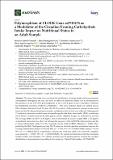Por favor, use este identificador para citar o enlazar a este item:
http://hdl.handle.net/10261/220192COMPARTIR / EXPORTAR:
 SHARE SHARE
 CORE
BASE CORE
BASE
|
|
| Visualizar otros formatos: MARC | Dublin Core | RDF | ORE | MODS | METS | DIDL | DATACITE | |

| Título: | Polymorphism of CLOCK gene rs3749474 as a modulator of the circadian evening carbohydrate intake impact on nutritional status in an adult sample |
Autor: | Camblor Murube, Marina; Borregon-Rivilla, Elena; Colmenarejo, Gonzalo; Aguilar-Aguilar, Elena; Martínez, J. Alfredo; Ramírez de Molina, Ana CSIC ORCID; Reglero, Guillermo CSIC ORCID ; Loria-Kohen, Viviana | Palabras clave: | Dietary parameters Single nucleotide polymorphism Carbohydrate intake Obesity |
Fecha de publicación: | 2020 | Editor: | Multidisciplinary Digital Publishing Institute | Citación: | Nutrients 12(4): 1142 (2020) | Resumen: | The aim of this study was to evaluate the distribution of energy intake and macronutrients consumption throughout the day, and how its effect on nutritional status can be modulated by the presence of the rs3749474 polymorphism of the CLOCK gene in the Cantoblanco Platform for Nutritional Genomics (“GENYAL Platform”). This cross-sectional study was carried out on 898 volunteers between 18 and 69 years old (65.5% women). Anthropometric measurements, social issues and health, dietary, biochemical, genetic, and physical activity data were collected. Subsequently, 21 statistical interaction models were designed to predict the body mass index (BMI) considering seven dietary variables analyzed by three genetic models (adjusted by age, sex, and physical activity). The average BMI was 26.9 ± 4.65 kg/m2, 62.14% presented an excess weight (BMI > 25 kg/m2). A significant interaction was observed between the presence of the rs3749474 polymorphism and the evening carbohydrate intake (% of the total daily energy intake [%TEI]) (adjusted p = 0.046), when predicting the BMI. Participants carrying TT/CT genotype showed a positive association between the evening carbohydrate intake (%TEI) and BMI (β = 0.3379, 95% CI = (0.1689,0.5080)) and (β = 0.1529, 95% CI = (−0.0164,0.3227)), respectively, whereas the wild type allele (CC) showed a negative association (β = −0.0321, 95% CI = (−0.1505,0.0862)). No significant interaction with the remaining model variables was identified. New dietary strategies may be implemented to schedule the circadian distribution of macronutrients according to the genotype. Clinical Trial number: NCT04067921. | Descripción: | This article belongs to the Special Issue Precision Nutrition. | Versión del editor: | https://doi.org/10.3390/nu12041142 | URI: | http://hdl.handle.net/10261/220192 | DOI: | 10.3390/nu12041142 | E-ISSN: | 2072-6643 |
| Aparece en las colecciones: | (CIAL) Artículos |
Ficheros en este ítem:
| Fichero | Descripción | Tamaño | Formato | |
|---|---|---|---|---|
| polymorsample.pdf | 784,11 kB | Adobe PDF |  Visualizar/Abrir |
CORE Recommender
PubMed Central
Citations
5
checked on 05-feb-2024
SCOPUSTM
Citations
9
checked on 15-abr-2024
WEB OF SCIENCETM
Citations
9
checked on 26-feb-2024
Page view(s)
123
checked on 22-abr-2024
Download(s)
153
checked on 22-abr-2024

